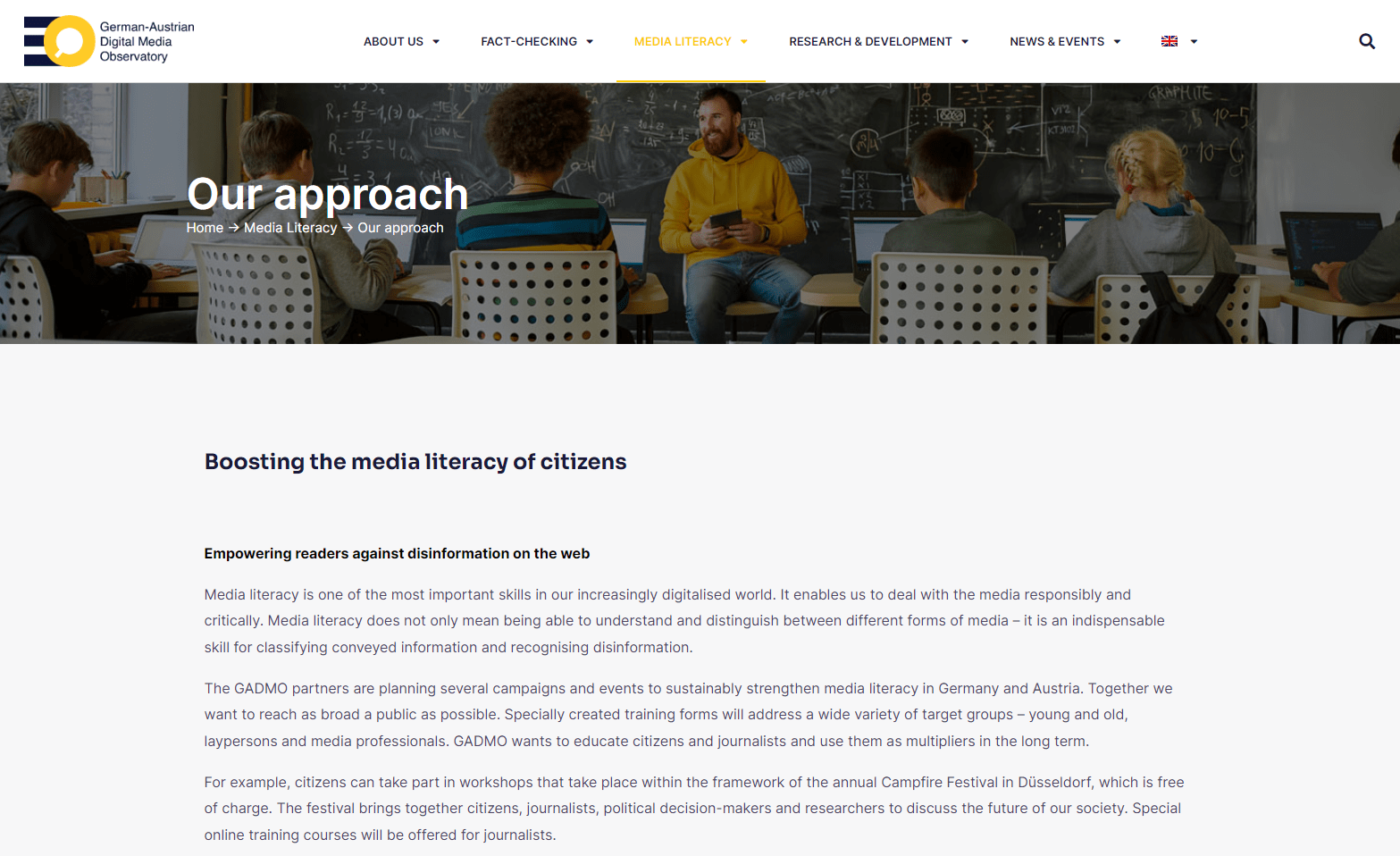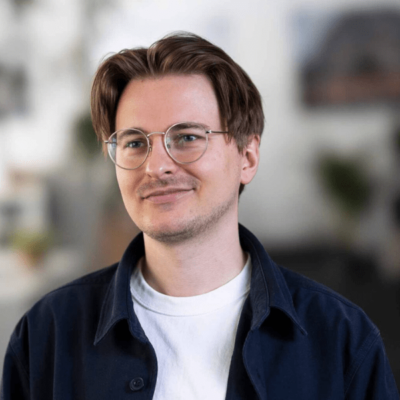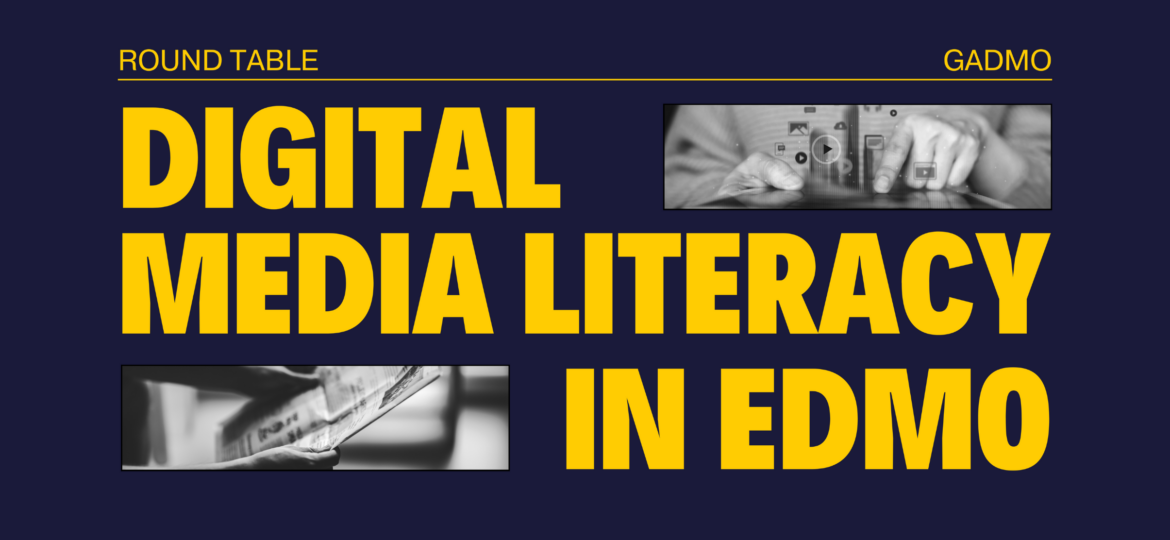Digital Media Literacy in EDMO Round Table: GADMO
This interview is part of the ”Digital Media Literacy in EDMO Round Table’‘ interview series that will be published every month to highlight the work of the 14 EDMO hubs. Conducted by the Media & Learning Association (MLA).

Who are the leading players in Germany and Austria when it comes to promoting media literacy?
In Germany and Austria, the most successful and comprehensive media literacy campaigns come from public institutions, authorities and ministries, but also from foundations, associations and non-profit organisations.
In Germany, for example, the Bundeszentrale für politische Bildung (Federal Agency for Civic Education) and the “Schau hin!” programme funded by the Ministry of Family Affairs and the two public broadcasters are currently the most comprehensive points of contact for digital media skills, especially for young people.
In Austria, there are various media literacy programmes from the Ministry of Education, but in particular from the non-profit organisation “Demokratiezentrum Wien” and the project “MISCHA – Medien in Schule und Ausbildung” (“Media in school and education”) from the
Verein zur Förderung der Nutzung von Zeitungen in der schulischen Ausbildung (Association for the promotion of the use of newspapers in school education).
In general, there are very few successful and, above all, visible ML campaigns from media companies or journalistic organisations. Although there are campaigns by journalistic initiatives at irregular intervals (especially during elections), these are hardly noticed publicly.
Do you have any idea as to how media-literate people in this region are generally? Are there any types of measures that can be used to assess this over time?
In general, media literacy in German-speaking countries is probably average by European standards. However, the digital skills of older sections of the population in particular show major shortcomings – this is particularly evident in the spread of very obvious fakes and disinformation, which are easy to see through for people with a higher level of media literacy.
A reduction in very poorly crafted fakes would be a clear indicator of a successful media literacy campaign.
What are the main challenges you face in promoting media literacy in these two countries?
As mentioned, the largest media literacy campaigns come from state institutions and not from independent organisations or media houses. This means that the currently very serious right-wing smear campaigns can easily denounce them as “state propaganda”. It would therefore make sense to place media literacy campaigns more in the hands of independent and more socially recognised organisations.
What value do you think EDMO and the network of EDMO hubs in particular bring to the challenge of fighting disinformation and promoting media literacy in Germany and Austria?
EDMO and the individual hubs bring together expertise, but also social respect for a wide variety of media companies and organisations. By integrating additional, independent and reputable media organisations, EDMO and GADMO could reach broad sections of society that have hardly been reached by existing state media literacy campaigns or that are already rejected by parts of the population due to politically motivated smear campaigns.
What types of media literacy activities have been organised by GADMO since it was set up?
GADMO has published two very different media literacy campaigns tailored to different target groups in society:
The campaign developed by CORRECTIV is designed to appeal to young people and pack media literacy skills into a single package with a modern and young language and eye-catching visuals. The goal was to equip teens with basic research tools and to provide a general understanding of what mis- and disinformation is and why it matters. Consequently, we scripted six videos. The first three focused on terminology and providing general tips: understanding the difference between mis- and disinformation; how to identify disinformation; how to spot reputable websites and sources in general. The other three centred around specific research skills: reverse image search; tips for working with search engines; geolocating. Two of our teen reporters from Salon5 agreed to be presenters in the video.
The campaign developed by dpa, APA and AFP focusses on a more mature audience with existing media literacy skills and aims to strengthen the professional toolkit that people with media proficiency already have. With this in mind, the fact checkers at GADMO provide an insight into their most important working techniques and verification tools. Media professionals can get helpful tips for their daily work in numerous tutorial videos. After all, verifying online profiles, localising photos and videos and checking images for manipulation is no longer a task for a select group of experts.
In addition, GADMO has held open workshops, such as most recently at the “b future” festival in Bonn. The workshop, which was part of the larger CORRECTIV stand, was also a contact point for providing interested citizens with flyers and explanatory material from GADMO. We did not count, but by a rough estimation more than a hundred people actively passed by the CORRECTIV stand. Building on our larger goal to involve citizens more in tackling mis- and disinformation, it might be worth mentioning that CORRECTIV has started the Faktenforum, a community fact-checking project for citizens. Participants of the workshop were thus also presented with the opportunity to join the Faktenforum and stay involved.
What plans do you have in relation to media literacy for the next 12 months for GADMO?
GADMO plans to develop further video workshops that provide professional media literacy content and the latest tools in a simple and clearly presented style. In addition, there will be further live workshops at various events in Germany, where interested citizens can discuss all questions about disinformation with the GADMO team in a barrier-free manner and find further information and learning material.

